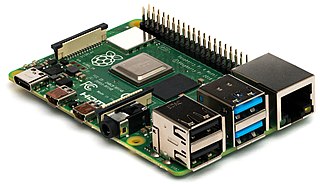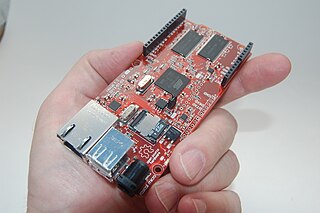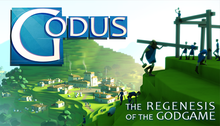
A Linux distribution is an operating system made from a software collection that is based upon the Linux kernel and, often, a package management system. Linux users usually obtain their operating system by downloading one of the Linux distributions, which are available for a wide variety of systems ranging from embedded devices and personal computers to powerful supercomputers.

Linux-based devices or Linux devices are computer appliances that are powered by the Linux kernel and possibly parts of the GNU operating system. Device manufacturers' reasons to use Linux may be various: low cost, security, stability, scalability or customizability. Many original equipment manufacturers use free and open source software to brand their products. Community maintained Linux devices are also available.

Linux is a family of open-source Unix-like operating systems based on the Linux kernel, an operating system kernel first released on September 17, 1991, by Linus Torvalds. Linux is typically packaged in a Linux distribution.

A smartwatch is a wearable computer in the form of a watch; modern smartwatches provide a local touchscreen interface for daily use, while an associated smartphone app provides for management and telemetry. While early models could perform basic tasks, such as calculations, digital time telling, translations, and game-playing, 2010s smartwatches have more general functionality closer to smartphones, including mobile apps, a mobile operating system and WiFi/Bluetooth connectivity. Some smartwatches function as portable media players, with FM radio and playback of digital audio and video files via a Bluetooth headset. Some models, called watch phones, have mobile cellular functionality like making calls.

Raspberry Pi is a series of small single-board computers developed in the United Kingdom by the Raspberry Pi Foundation in association with Broadcom. The Raspberry Pi project originally leaned towards the promotion of teaching basic computer science in schools and in developing countries. The original model became more popular than anticipated, selling outside its target market for uses such as robotics. It is widely used in many areas, such as for weather monitoring, because of its low cost, modularity, and open design. It is typically used by computer and electronic hobbyists, due to its adoption of HDMI and USB devices.
Adapteva is a fabless semiconductor company focusing on low power many core microprocessor design. The company was the second company to announce a design with 1,000 specialized processing cores on a single integrated circuit.

Pebble is a discontinued smartwatch developed by Pebble Technology Corporation. Funding was conducted through a Kickstarter campaign running from April 11, 2012 to May 18, 2012, which raised $10.3 million; it was the most funded project in Kickstarter history, at the time. Pebble began shipping watches to Kickstarter backers in January 2013. Pebble watches can be connected to Android and iOS devices to show notifications and messages. An online app store distributes Pebble-compatible apps from many developers including ESPN, Uber, Runkeeper, and GoPro.

The Ouya, stylized as OUYA, is an Android-based microconsole developed by Ouya Inc. Julie Uhrman founded the project in 2012, bringing in designer Yves Béhar to collaborate on its design and Muffi Ghadiali as VP of Product Management to put together the engineering team. Development was funded via Kickstarter, raising US$8.5 million, becoming one of the website's highest earning projects in its history.

Rascal is a single-board computer. It is designed by Brandon Stafford and sold by Rascal Micro LLC in Somerville, Massachusetts.
Allwinner Technology is a fabless semiconductor company that designs mixed-signal systems on a chip (SoC). The company is headquartered in Zhuhai, Guangdong, China. It has a sales and technical support office in Shenzhen, Guangdong, and logistics operations in Hong Kong.

Godus is a video game in the god game genre, developed by the independent company 22cans and published by DeNA. The company launched a Kickstarter campaign to raise funds and met their funding goal of GB£450,000 on 20 December 2012. Godus was designed by Peter Molyneux, who described it as the spiritual successor to his earlier creation, Populous. While the mobile versions of the game continue to be updated, the early access Steam release has yet to see an updated beta since 2016. The contract of the lead developer of the game, Konrad Naszynski, expired 28 June 2016, and it has been reported that there is no one left working on the PC version.

Intel Quark is a line of 32-bit x86 SoCs and microcontrollers by Intel, designed for small size and low power consumption, and targeted at new markets including wearable devices. The line was introduced at Intel Developer Forum in 2013. Quark processors, while slower than Atom processors, are much smaller and consume less power. They lack support for SIMD instruction sets and only support embedded operating systems. Quark powers the Intel Galileo developer microcontroller board. However, in 2016 Arduino released the Arduino 101 board that includes an Intel Quark SoC. The CPU instruction set is the same as a Pentium (P54C/i586) CPU.

Intel Galileo is the first in a line of Arduino-certified development boards based on Intel x86 architecture and is designed for the maker and education communities. Intel released two versions of Galileo, referred to as Gen 1 and Gen 2. These development boards are sometimes called "Breakout boards".
Pine64 is an organization which designs, manufactures and sells single-board computers, notebook computers and smartphones.

Makeblock is a private Chinese technology company headquartered in Shenzhen, China, that develops Arduino-based hardware, robotics hardware, and Scratch-based software, for the purpose of providing educational tools for learning. This includes programming, engineering, and mathematics through the use of robotics.
The Libre Computer Project is an effort initiated by Shenzhen Libre Technology Co., Ltd., with the goal of producing standards-compliant single-board computers (SBC) and upstream software stack to power them.










